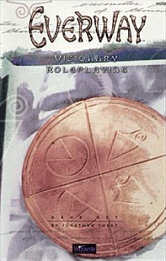I started to feel that I didn’t know roleplaying games well enough so I came up with the plan to read a roleplaying game corebook for every year they have been published. Selection criteria is whatever I find interesting.

Everway is a fantasy roleplaying game of travel between worlds designed by Jonathan Tweet and published by Wizards of the Coast. It came out at the tail end of the Nineties fashion for games where the characters travel between dimensions, realities and planes of existence. Other examples are Torg and the D&D setting Planescape.
In Everway, the characters are called Spherewalkers. Everway is a city located at a nexus of gates to scores of different spheres. A handy starting point for adventure!
In style, Everway’s fantasy has a strong anthropological feel. Basket weaving and kinship charts are never far off. The game devotes lots of energy into explaining the system of marriage in the city of Everway.
As a boxed set, Everway is a fun package. It’s taller than normal boxed sets, making it hard to shelve. This immediately earns it hipster points. Inside, there are three books, maps, pre-made characters, empty character sheets and a whole bunch of cards.
The game uses three overlapping mechanics for task resolution, based on whatever the GM feels like at the moment. If the story demands a certain outcome, the GM goes with that. They can also compare the stats of the characters and see if these suggest an obvious outcome. For example, Fire is a stat governing combat, so a character with a Fire of 7 will beat someone with a Fire of 3.
Finally, the GM can use the Fortune Deck. This comes with the game and resembles a Tarot deck, except customized thematically to the needs of Everway. The GM picks a card or can perform a more complex reading to figure out what happens. One of the three books included in the game is a guide to how this is done.
The game also has quest cards featuring images connected to the introductory adventure and a big stack of vision cards featuring art that can be used for inspiration when improvising during the game.
The card decks are bizarrely luxurious, as if the producers of the game had a huge stack of unused art assets they just wanted to put somewhere.
The freewheeling style permeates all parts of Everway’s system. There’s are loose guidelines for how to come up with powers for characters and a magic system of sorts. The mechanics would be ridiculously easy to exploit but that would also render the whole game pointless.
For me, this is Everway at it’s most charming. It’s clearly designed for people who are making an honest good-faith effort to create fun roleplaying experiences together.